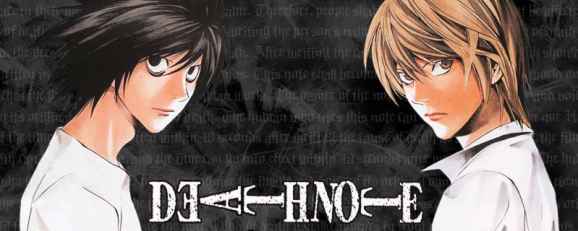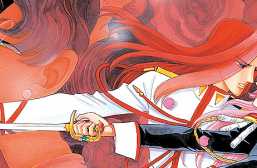Death Note: A Second Look At Morality

Have you ever wondered what would you do if you obtained the power to end someone’s life at your own will? Do you just dispose of that power? Or use it to satisfy your selfish desires and “kill” the people you detest the most? Or do you go for a grander scheme, like becoming the savior of the world?
Death Note, is a show which constantly tests your judgment on morality of the characters. Yagami Light, or Kira, an ordinary high school student, who stumbled upon a weird book we all could later discern as the “Death Note.” Initially doubtful, he tested it on some random criminal and to his astonishment, it works out exactly the same way as described in the book. Since then, Light’s life had been “ruined.” He began to have a delusion that he is the world’s savior; a god, and became inhumane and merciless, killing criminals and even innocent bystanders who stood in his way.
L, on the other hand, is a world renowned detective who took on the challenge to solve the Kira serial murdering case. Without second guessing, he immediately viewed Kira as “evil,” and made plans to defeat his unseen opponent. Using his extraordinary skills, he managed to track down the real identity of Kira to certain individuals, and one of them includes Yagami Light.
Aforementioned, the study on character’s morality in Death Note is quite the interesting theme. Light had good intentions originally, but having such a god-like power at his disposal, it’s inevitable he would use it for much more grand, if not dominating schemes. Having such surefire power, he viewed that his actions are always right; he didn’t even blink an eye while murdering countless humans, be it criminals, investigators nor just innocent bystanders. We are humans, we all have a darker side, though Light may have succumbed to his dark side a bit too easily; it was just like a kid who stumbled upon a new toy, immediately satisfying his greed for world evolution.
Although L may have blatantly viewed Light as “evil,” L himself may have indirectly ended a few lives of some other criminals on his own investigations as well. He is a mysterious enigma, but I’m sure it should be no surprise that he might be involved in a number of killings. He made vague decisions which caused quarrels within his group to erupt at times. He also used harsh and brutal interrogation methods as well, shown in one scene where he trapped Misa for an extended period of time, just to get some answers.
Ethics is a complicated matter, even more so when one is judging who is right, and who is wrong; whose is real justice. Justice and righteousness always seem like such vague words, since I do not think every human is completely without sins no matter how passive they are. At that end, it all comes down to the “scale” of his sins. Indeed, both Kira and L are sinful but if I were to pick, L would be a better preference for obvious reasons.
Kira, an idealist, who desires to be a god and to create a new world, and L, a realistist, who abides by the law and doesn’t just blindly follow justice. These two individuals are so different, yet so similar at the same time. Whose morals do you think is the “right” one? And whose do you think is the “wrong” one?
What do you think? Leave a comment.











An interesting quote comes into mind when determining who is in the right here. As Sterne cleverly noted “Respect for ourselves guides our morals; respect for others guides our manners”.
Kira is a victim of black and white morality. If you commit any criminal offense, you are beyond saving and deserve automatic eradication.
But what really bothered me was his arrogance. Only HE could use the Death Note to change the world. Anyone who believes what he is doing is evil deserves to die for questioning him. He will create a new world just so he can rule over it as god.
He’s basically just a spoiled, childish, manipulative sociopath with a massive God complex. If you give someone like Charles Manson a Death Note, you’ll get the same result.
Same thoughts. At first, he was at least somewhat doing it for justice but halfway through, he’s basically just murdering everyone who get’s in his way. He’s pretty much a stubborn, childish kid who found a new power to mess around with.
Indeed, both the moral viewpoints of oneself and others are equally important.
Excellent article. Should murders be justified for the sake of the world, or rather, one’s view of a “perfect” world?
The problem with Kira is that he was no longer doing it for the world halfway through the series, he wants to evolve humanity and reign the new humanity as the God. It’s a pretty arrogant, childish thought.
Delete the ‘t’ from your name and make it official.
im not biased or anything… but L instantly wins any debate because of his pure awesomeness >.> <.<
seriously though… L doesnt really kill anyone (that i recall)… he just lets light kill them… light starts resembling the kid frying ants with a magnifying glass pretty quickly (i was sad when L died… laughed when light did)
– also; you may want to proof read writing if you're going to post it as an article (/more than just a plot summary and question wouldve hooked me more)
That’s indeed an obvious choice.
And that’s where the “scale” comes in, L “did” a few things here and there, in fact I don’t think he even minded sacrificing just to learn some truth, whether or not it’s others or himself (he did infiltrated Light’s school at some point)
I’ll try my best. Thank you.
Regardless of whether Light was a nice and humble person or an obsessed-with-his-new-world-plan narcissist, what he was doing to start with, “cleaning the world” was not a bad thing. The exact opposite in fact, it was a good thing. The only objection to the whole deal and the moral issue that arises is whether murder is acceptable or not. Well it’s obviously not, considering the police were after him for it and you know, people got arested for it, but let’s consider for a sec. How is what Kira was doing different to what the government was doing? Capital punishment anyone?
Very well said!
The thing is that he wasn’t even just killing criminals a little later, he killed investigators, polices and other people who get in the way. He’s insanely apathetic too, he killed some minor criminals just to do some experiments, and didn’t actually minded much when his own family members die.
But it is an interesting point. both the Death Note and law systems like those serves to control humanity, to avoid criminal activities. But if you were to ask me, I’d rather choose the latter, Light kills small-time criminals and even innocents who doesn’t even deserve such heavy treatments like a death penalty, unlike capital punishment where the “scale” of the crimes the criminals committed is still controlled.
LOL I love how these questions are all asked in the series… it’s pretty much what the series aims to do – make you think about it!
On one hand, I think it would be cool for there to be a world without criminals, at the same time though, it would only create more criminals!
And Death Note’s particularly good in doing that^^
In the end, I think humans can’t fully be controlled, even with things like law and justice.
This anime really drew me in with the existence of the “Death Note”. I think it was interesting how they came up with the theology on the various Death Gods.
What would you do with the power over death? This is the main question this series asks and does a tremendous job showing.
Indeed. They are quite fitting with the morality analysis theme.
My favorite part of Death Note is the faith of L. It was a great twist that made Kira’s character development perfect for the grand finale. Good read Kai!
Thanks, glad you like it.
It is as you said – if you really want to find fault with L, or Kira, or indeed any other human (fictional or not) you will assuredly find something wrong with them.
All the bitching about right and wrong that tries to find out which is “more right” kind of misses the point.
That’s definitely a tough question. I mean any rule or rhyme or reason you set up whether it’s a law or a personal standard on doling out punishment is not made by the universe, but is made by a human. So no matter how you look at it, the morality of that punishment could always be challenged. And sometimes the crime is not as important as the motive to do the crime. For example I would punish someone who stole bread because they were dying of hunger differently than I’d punish someone who stole bread from that poor starving person just to be mean. Just saying, whether you follow your own rules or laws, they were still created by people.
Great article!
Death Note is such an engaging anime in terms of moral ambiguity. Light quickly transforms into egotistic sociopath, which makes me wonder if he ever had good intentions. Perhaps he killed out a sense of aesthetics. He simply viewed criminals as aesthically repulsive and wanted to create a world that suited his tastes. I would argue that L is actually a very moral character. Although he does allow Kira to kill certain criminals and is not hesitant in using extreme measures, he does seem to care about innocent lives. Consider his reaction when the second Kira killed a detective outside of the television studio.
I think Mello and Near are also excellent examples of moral ambiguity (especially Mello).
I love Death Note, and I love that every charcter that is important to the plot is neither all black nor all white, they are all…like antiheros.
L is more morally justified in his actions when compared to Light. This is because, though Light’s objective of eradicating crime may be seen as noble, his methods of doing so is not. Light wishes to become a god of a new world without crime. Choosing to create that world by murdering the perpetrators of crime would mean that Light’s means of ruling as this “god” is through tyranny and oppression.
Though such methods may stop crime if left unchecked, it will also lead to the creation of a society in which a single ruler controls all, and fear of death leads to no resistance. Essentially, if Light’s plan was to prevail, the citizens would be stripped of their free will and ability to think for themselves. I believe such a world is worse than a world with crime. My reason for this belief is that it indirectly punishes undeserving citizens and strips away people’s ability to think (a vital component to the growth of human civilization).
On the other hand, though L had to get his hands dirty in the process, he was simply trying to put an end to this goal. Seeing the circumstance, I believe that it is clear to see that L is more so morally “right” when compared to Light.